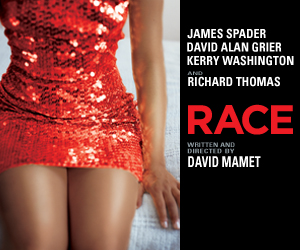Related Research Articles

David Alan Mamet is an American playwright, filmmaker, and author. He won a Pulitzer Prize and received Tony nominations for his plays Glengarry Glen Ross (1984) and Speed-the-Plow (1988). He first gained critical acclaim for a trio of off-Broadway 1970s plays: The Duck Variations, Sexual Perversity in Chicago, and American Buffalo. His plays Race and The Penitent, respectively, opened on Broadway in 2009 and previewed off-Broadway in 2017.

Patti Ann LuPone is an American actress and singer best known for her work in musical theatre. After starting her professional career with The Acting Company in 1972 she soon gained acclaim for her leading performances on the Broadway and West End stage. She has won three Tony Awards, two Olivier Awards, and two Grammy Awards, and was a 2006 inductee to the American Theater Hall of Fame.

Ethan Phillips is an American actor and playwright. He is best known for his television roles as Neelix on Star Trek: Voyager and PR man Pete Downey on Benson.
David Rasche is an American theater, film, and television actor who is best known for his portrayal of the title character in the 1980s satirical police sitcom Sledge Hammer! Since then he has often played characters in positions of authority, in both serious and comical turns. In television he is known for his main role as Karl Muller in the HBO drama series Succession and his role as Alden Schmidt in the TV Land comedy series Impastor, as well as recurring and guest performances in numerous programs including L.A. Law, Monk, The West Wing, Veep, Bored to Death, and Ugly Betty.

Glengarry Glen Ross is a 1992 American drama film written for the screen by David Mamet from his 1984 Pulitzer Prize–winning play of the same name, and directed by James Foley. The film depicts two days in the lives of four real estate salesmen, and their increasing desperation when the corporate office sends a motivational trainer to threaten them that all but the top two salesmen will be fired within two weeks.
American Buffalo is a 1975 play by American playwright David Mamet that had its premiere in a showcase production at the Goodman Theatre, Chicago. After two additional showcase productions, it opened on Broadway in 1977.
Sexual Perversity in Chicago is a play written by David Mamet that examines the sex lives of two men and two women in the 1970s. The play is filled with profanity and regional jargon that reflects the working-class language of Chicago. The characters' relationships come to be hindered by the caustic nature of their words, as much of the dialogue includes insults and arguments. The play presents "intimate relationships [as] minefields of buried fears and misunderstandings."
Boston Marriage is a 1999 play by American playwright David Mamet. The play concerns two women at the turn of the 20th century who are in a Boston marriage, a relationship between two women that may involve both physical and emotional intimacy. After widespread belief that Mamet could only write for men, the playwright released this play, which centers exclusively on women.

Atlantic Theater Company is an Off-Broadway non-profit theater, whose mission is to produce great plays "simply and truthfully utilizing an artistic ensemble." The company was founded in 1985 by David Mamet, William H. Macy, and 30 of their acting students from New York University, inspired by the historical examples of the Group Theatre and Stanislavski. Atlantic believes that the story of a play and the intent of its playwright are at the core of the creative process.
Romance is a play by David Mamet. It premiered Off-Broadway in 2005 and also ran in London.
Brian MacDevitt is a lighting designer and educator. He has worked extensively on Broadway and Off Broadway, as well as touring, Regional theatre, and Industrial productions. He won the Tony Award for Best Lighting Design for his work on the 2002 Broadway revival of Into The Woods. He also won the Tony Award for Best Lighting Design in a Play three times and the Tony Award for Best Lighting Design in a Musical once for The Book of Mormon in 2011.
Kevin Adams is an American theatrical lighting designer. He has earned four Tony Awards for lighting design.

The Water Engine is a 1977 play by David Mamet that centers on the violent suppression of a disruptive alternative energy technology.

Race is a play by David Mamet that premiered on Broadway in December 2009. Mamet has stated that the intended "theme is race and the lies we tell each other on the subject."
Robert Francis LuPone was an American actor and artistic director. He worked on stage, in film, and in television. He was the brother of actress Patti LuPone.
Detroit is a play by Lisa D'Amour. It was a finalist for the Pulitzer and Susan Smith Blackburn Prizes. The play premiered at the Steppenwolf Theatre Company in Chicago in 2010 and subsequently ran Off-Broadway at Playwrights Horizons in fall 2012. The play won the Obie Award for Best New American Play in 2013.

After Midnight is a Broadway musical that premiered at the Brooks Atkinson Theatre in 2013. The revue is based on an earlier 2011 revue, titled Cotton Club Parade, which ran in concert at Encores! in 2011 and 2012.
China Doll is a two-act play by David Mamet about political corruption and brutal violence. The play opened on Broadway at the end of 2015 with a short run scheduled to close at the end of January 2016. The two-act play contains only two characters who appear on stage throughout the play, Mickey and Carson.
The Anarchist is a two-person play by David Mamet that opened on Broadway in 2012, starring Patti LuPone and Debra Winger. The play shows an interrogation between a female prison parole review officer and a female former domestic terrorist. The title character, though fictional, is based on two female members of the 1970s American militant organization Weather Underground, Judith Alice Clark and Kathy Boudin, who both took part in the fatal 1981 Brink's robbery.

War Paint is a musical with music by Scott Frankel, lyrics by Michael Korie, and a book by Doug Wright. It is based both on Lindy Woodhead's 2004 book War Paint and on the 2007 documentary film The Powder & the Glory by Ann Carol Grossman and Arnie Reisman.
References
- 1 2 "The Woods in New York — David Mamet Society". Mamet.eserver.org. Retrieved 2012-05-27.
- ↑ Mamet, David (1979). The Woods: A Drama - David Mamet - Google Boeken. ISBN 9780573618192 . Retrieved 2012-05-27.
- 1 2 3 4 Stevenson, Sarah Lansdale. "The Woods in New York." The David Mamet Society. January 24, 1997.
- 1 2 Grimes, William. "On Stage, and Off." New York Times . January 17, 1997. (p. 2 of 2).
- ↑ Taylor, Paul. "The Woods: Finborough Theatre, London." The Independent . October 15, 1996.
- ↑ Spinrad, Diana. The Woods. Chicago Reader . July 14, 1988.
- 1 2 Kane, Leslie (ed). David Mamet in Conversation. University of Michigan Press, 2001. pp. 68–69.
- 1 2 Rich, Frank. "Patti Lupone in Mamet's The Woods." New York Times . May 17, 1982.